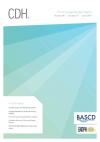Community Dental Health

- Cover Date:
- June 2017
- Print ISSN:
- 0265 539X
- Vol:
- 34
- Issue:
- 2
Factors affecting dental fluorosis in low socioeconomic status children in Mexico
Objective: To assess the association between dental fluorosis and maternal education in schoolchildren of medium and low socioeconomic status in a low income region of Mexico. Design: Cross-sectional study. Settings: Public schools in the south-central region of Oaxaca, Mexico where the mean fluoride water concentration was 1.01 mg/L (SD 0.21; range 0.71-1.40). Fluoridated salt (200mgF/kg) was available in the region. Participants: 794 schoolchildren. Methods: To identify the socioeconomic status of the participants, the Bronfman index was used. Dental fluorosis was assessed applying the Thysltrup-Fejerskov Index, (TF). Results: The children’s mean age was 10.4 (SD 1.2) years. The prevalence of dental fluorosis (TF>0) was high 95.7% and 45.2% of the children showed dental fluorosis of TF≥4. The percentage of children showing TF≥4 was 48.8% where their mothers’ education was <6 years of schooling compared to 36.7% among other children (p<0.001). The multinomial logistic regression model using as base outcome category TF≤2 showed that severe forms of fluorosis (TF≥4) were associated with the consumption of boiled water, (OR= 1.65, p=0.039) of fluoridated salt (OR= 2.61 p=0.001), high brushing frequency (OR=3.12, p=0.001) and lower maternal education (OR=1.71, p=0.007). Conclusions: A high prevalence of dental
fluorosis was observed in the study region. An unequal burden of fluorosis in aesthetically objectionable categories was found in children exposed to several sources of fluoride and whose mother had lower educational level.
Key words: dental fluorosis, socioeconomic factors, maternal education, schoolchildren, public dental health, México
doi:10.1922/CDH_3981Perez-Perez06
- Article Price
- £15.00
- Institution Article Price
- £
- Page Start
- 66
- Page End
- 71
- Authors
- N. Pérez-Pérez, M.E. Irigoyen-Camacho, A.S. Boges-Yañez
Articles from this issue
- Title
- Pg. Start
- Pg. End
- Communities in action: developing a dental ambassador training programme for adults with learning disability
- 77
- 79
- Public health intervention over four decades for the children in the Australian Capital Territory: Have we reached the point of diminishing returns?
- 84
- 87
- Relationship between mental health risk factors and oral symptoms in adolescents: Korea Youth Risk Behavior Webbased Survey, 2013
- 88
- 92
- PeP-SCOT a health coaching intervention for people in prisons: the development of the intervention protocol
- 97
- 101
- Productive efficiency and its determinants in the Community Dental Service in the north-west of England
- 102
- 106
- Socio-demographic and area-related factors associated with the prevalence of caries among preschool children in Greece.
- 112
- 117
- Dental caries experience, rather than toothbrushing, influences the incidence of dental caries in young Japanese adults
- 118
- 121
